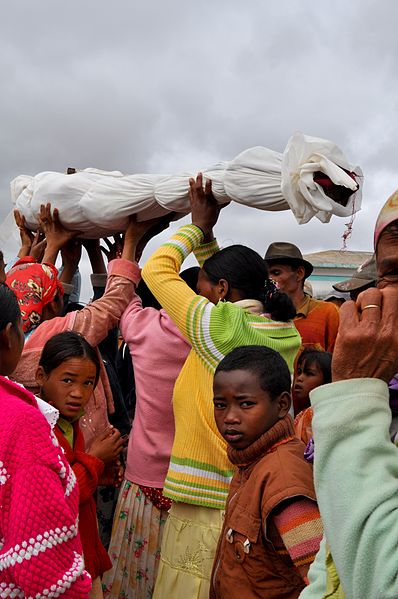The Malagasy people of Madagascar believe that the spirits of people who have died won’t join the world of their ancestors until after the body has completely decomposed. To assist the process, families perform a funerary tradition called Famadihana, “the turning of the bones” over the several years after a person has died.
In this tradition, families unearth the bodies of loved ones they’ve lost from family crypts or burial sites and rewrap them in fresh silk burial shrouds, usually once every seven years. Once the body is freshly-wrapped, they will hoist it into the air as a group and dance with it around the tomb. Then they celebrate the reburial, in some cases in a newer, better crypt — one the family wasn’t able to afford at the time of death but can after years have passed.
The ritual allows the Malagasy people to re-connect with and thank their ancestors, even after death. “It is good to thank the ancestors in person because we owe them everything,” Rakotonarivo Henri, 52, told the New York Times in 2010. “We do not come from mud; we come from these bodies.”
The ceremony involves a lively celebration, with live music, singing, dancing, drinks, food, and family gathered to celebrate life, honor the dead, and connect with loved ones. Families bring offerings of zebu meat, stews, soups, drinks, sweets and more. The event is like a family reunion, where both the living and the dead are invited! Unlike solemn funeral traditions around the world, famadihana is a time for celebration and laughter, not mourning. Family from around the world, as well as important people from the town, and even the occasional passersby are welcome to join in the event.
Famadihana is believed to be a relatively young tradition, only beginning in about the seventeenth century. The practice is already beginning to decline, though, due in part to the cost of silk shrouds and also to opposition from Evangelical Protestants.
Learn about more death rituals around the world:
Image by Hery Zo Rakotondramanana (Creative Commons)

 Famadihana Death Ritual in Madagascar
Famadihana Death Ritual in Madagascar



 First the Wealth Gap, Now the U.S. Has a Growing Health Gap
First the Wealth Gap, Now the U.S. Has a Growing Health Gap
 How to Comfort A Dying Loved One
How to Comfort A Dying Loved One
 Our Annual Seven Holiday Gifts for Someone Who Is Grieving, 2024 Edition
Our Annual Seven Holiday Gifts for Someone Who Is Grieving, 2024 Edition














